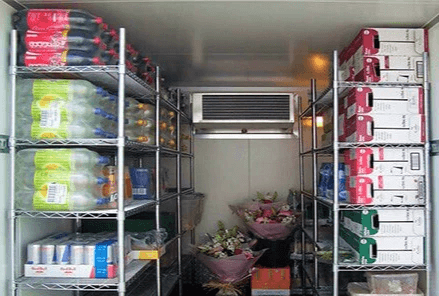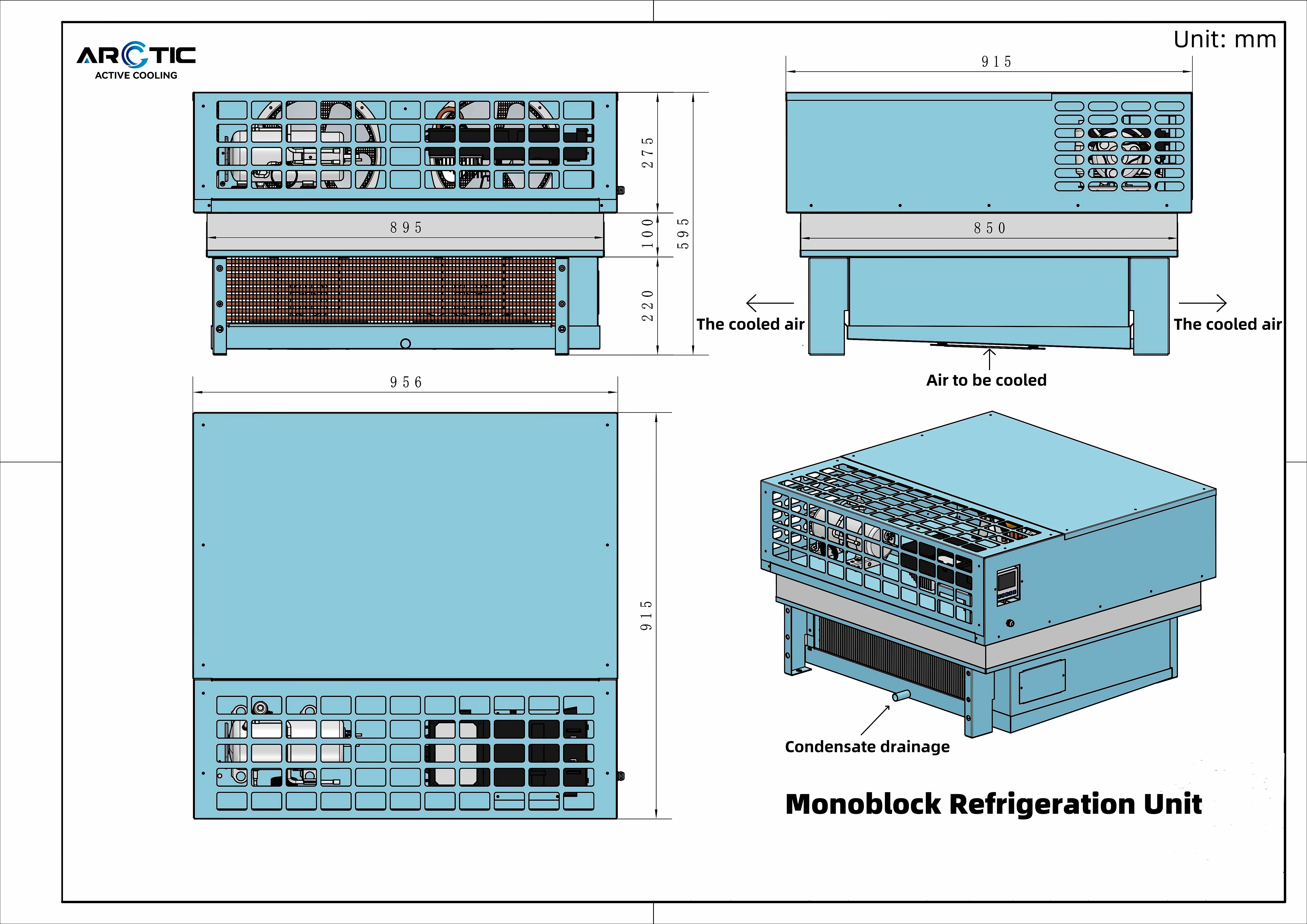Introduction

"Arctic Active Cooling. Endless Possibilities. We capture new technologies in mobile and compact cooling. Full-size cooling in a miniature design, customized to make your device stand out with innovative thermal management."
In the world of transportation and logistics, van refrigeration units play a pivotal role in maintaining the integrity of perishable goods. Whether you're delivering fresh produce, pharmaceuticals, or frozen foods, these units ensure that your cargo remains at optimal temperatures throughout the journey. Understanding what a van refrigeration unit is and how to select the right one can make all the difference in preserving quality and meeting regulatory standards.
The Importance of Van Refrigeration Units
Van refrigeration units are essential for businesses that depend on transporting temperature-sensitive products. They not only help maintain freshness but also extend shelf life, which is crucial in today’s competitive market. By investing in reliable refrigeration units for large or small trucks, companies can enhance their operational efficiency and customer satisfaction.
How to Choose the Right Unit
Choosing the right van refrigeration unit involves several considerations tailored to your specific needs. First, assess your cargo type and volume to determine which unit will provide adequate cooling capacity; understanding what are the units for refrigeration capacity will help you make an informed decision. Additionally, factors such as energy efficiency, installation requirements, and maintenance support should influence your choice.
Key Features to Consider
When selecting a van refrigeration unit, it's important to focus on key features that can enhance performance and reliability. Look for advanced technology options like digital temperature controls or remote monitoring systems that provide real-time data on your cargo's conditions; knowing what are the basic units of refrigeration system can guide you here as well. Furthermore, consider durability and ease of maintenance—features that ensure long-term functionality without excessive downtime.
What is a Van Refrigeration Unit?

Van refrigeration units are specialized cooling systems designed to maintain specific temperature ranges within commercial vehicles, particularly vans. These units ensure that perishable goods, such as food and pharmaceuticals, are transported safely without compromising quality. By utilizing advanced technology, van refrigeration units provide reliable cooling solutions tailored to various operational needs.
Definition and Functionality
A van refrigeration unit is a system integrated into delivery vans that maintains a controlled environment for temperature-sensitive cargo. It functions by circulating refrigerant through evaporators and condensers, effectively removing heat from the interior of the vehicle to keep contents cool. This process is crucial for businesses relying on the safe transport of perishables, ensuring products remain fresh until they reach their destination.
Different Types Available
There are several types of van refrigeration units available in the market today, catering to different vehicle sizes and cooling requirements. These include direct drive systems powered by the vehicle's engine and electric truck refrigeration units that operate independently of the engine. Additionally, options like split systems offer flexibility in installation while providing efficient temperature control for both large and small trucks.
Typical Applications
Van refrigeration units find applications in various industries where maintaining specific temperatures is essential during transit. Common uses include transporting fresh produce, dairy products, frozen foods, and even pharmaceuticals that require strict temperature regulation. These versatile systems are indispensable for businesses such as grocery distributors, catering services, and medical supply companies that rely on consistent cold chain management.
Understanding Refrigeration Capacity

What Are the Units for Refrigeration Capacity?
Refrigeration capacity is typically measured in BTUs (British Thermal Units) per hour or in tons. One ton of refrigeration is equivalent to 12,000 BTUs per hour and represents the amount of heat required to melt one ton of ice in a 24-hour period. For those looking into van refrigeration units or even Refrigeration Units for Large or Small Trucks, knowing these units helps determine which model will best suit their cooling needs.
In practical terms, when evaluating different models like a truck refrigeration unit versus a van unit, understanding these measurements allows users to compare efficiency and suitability based on load requirements. For instance, a higher BTU rating indicates a more powerful unit capable of handling larger volumes of cargo effectively. Therefore, when selecting your ideal van refrigeration unit, pay close attention to its rated capacity expressed in these standard units.
Basic Units of Refrigeration System Explained
The basic components that make up any refrigeration system include the evaporator, condenser, compressor, and expansion valve—each playing a pivotal role in maintaining desired temperatures within van refrigeration units. The evaporator absorbs heat from inside the refrigerated space while converting refrigerant from liquid to gas; this process cools down the air inside the van or truck.
Next up is the compressor which pumps this gas back into the condenser where it releases heat outside and returns back to liquid form—essentially completing the cycle! Understanding what are the basic units of refrigeration system helps users appreciate how each part contributes to achieving optimal performance and efficiency in cooling operations.
For those considering Electric Truck Refrigeration Units specifically designed for eco-friendly operations, knowing how these components work together can help ensure you select an efficient model that meets both environmental standards and your business needs.
Factors Affecting Refrigeration Capacity
Several factors can significantly affect refrigeration capacity when using van refrigeration units or any other type of cooling system. Ambient temperature plays a critical role; as outside temperatures rise, more energy may be needed to maintain internal conditions—this means that during hot summer months you might need a more powerful unit compared to cooler seasons.
Another important factor includes insulation quality within your vehicle; better insulation minimizes heat transfer from outside thus allowing your refrigerator unit to operate more efficiently without overworking itself. Additionally, load size also affects performance—overloading can lead to insufficient cooling while underloading may mean wasted energy as systems run unnecessarily at full throttle.
Ultimately understanding these factors not only aids in selecting appropriate Refrigeration Units for Large or Small Trucks but also ensures optimal operation once you've made your choice!
Truck Refrigeration Units vs. Van Units

When it comes to transporting temperature-sensitive goods, understanding the differences between truck refrigeration units and van refrigeration units is crucial. Both types of systems are designed to maintain specific temperatures during transit, but they cater to different needs and applications. Let's dive into what each unit offers and how they compare.
What is a Truck Refrigeration Unit?
A truck refrigeration unit is specifically designed for larger vehicles, typically used in the transportation of perishable goods over long distances. These units can be mounted on box trucks or trailers and are equipped with powerful cooling systems that ensure optimal temperature control throughout the journey. Unlike van refrigeration units, which are often tailored for smaller loads, truck refrigeration units can handle substantial capacity requirements, making them ideal for businesses that deal with bulk deliveries.
Key Differences and Similarities
While both van refrigeration units and truck refrigeration units serve the same fundamental purpose—keeping products at a specific temperature—there are notable differences between them. Van refrigeration units are generally more compact and suited for smaller deliveries, making them perfect for urban environments where maneuverability is essential. In contrast, truck refrigeration units tend to have higher cooling capacities and are better suited for large-scale operations involving prolonged transport times or extensive routes.
Despite these differences, both types share some similarities in functionality; they utilize similar principles of thermodynamics to maintain low temperatures within their respective compartments. Additionally, both can be powered by diesel engines or electric sources depending on operational needs; however, electric truck refrigeration units have gained popularity due to their environmental benefits.
Best Applications for Each Type
Van refrigeration units excel in applications where space is limited but efficiency remains critical—think local grocery stores or food delivery services that require quick turnarounds without compromising product quality. These systems work well in urban settings where navigating tight streets is part of daily operations.
On the other hand, truck refrigeration units shine when it comes to transporting large quantities of perishable items over long distances—perfect for wholesale distributors or companies engaged in cross-country shipping. Their robust design allows them to accommodate varying loads while maintaining consistent temperatures across extended journeys.
In summary, whether you're considering van refrigeration units or looking into larger options like Refrigeration Units for Large or Small Trucks depends largely on your business needs and operational scale.
Top Picks for Van Refrigeration Units

When it comes to choosing the right van refrigeration units, several options stand out for their efficiency, reliability, and performance. These units cater to various needs, whether you're transporting delicate flowers or frozen goods. Below are some top picks that exemplify what modern refrigeration technology can achieve.
Arctic Active Cooling Top-Mounted Monoblock Refrigeration Unit
The Arctic Active Cooling Top-Mounted Monoblock Refrigeration Unit is a game-changer in the realm of van refrigeration units. Designed specifically for commercial refrigerators and freezers, this unit excels in maintaining optimal humidity and temperature levels, making it perfect for applications like storing fresh flowers in florists and wholesale flower markets. With its innovative all-in-one design, this unit offers unparalleled efficiency and reliability that businesses can trust.
One of the standout features of the Arctic unit is its ability to meet the demands of modern cooling applications while being environmentally friendly. This makes it an excellent choice not just for those needing refrigeration units for large or small trucks but also for businesses committed to sustainability. By investing in such advanced technology, you ensure your products remain fresh while minimizing your carbon footprint.
Thermo King V-800 Series
Next on our list is the Thermo King V-800 Series, which has built a solid reputation among van refrigeration units users worldwide. Known for its versatile performance across various temperature ranges, this series is ideal for transporting everything from pharmaceuticals to perishable food items. The Thermo King V-800 offers robust durability combined with energy-efficient operation—making it a favorite among fleet operators.
What sets this series apart is its user-friendly interface that allows operators to monitor temperatures easily and make adjustments on-the-fly. Additionally, these units are designed with advanced insulation technology that maximizes refrigeration capacity while minimizing energy consumption—an essential feature when considering what are the basic units of a refrigeration system? Fleet managers will appreciate how these features contribute to overall operational efficiency.
Carrier Transicold X4 Series
Last but not least is the Carrier Transicold X4 Series, another exceptional option within the realm of van refrigeration units. This series is engineered specifically for urban delivery applications where space and weight limitations are critical factors to consider when selecting a unit. The X4 Series combines lightweight construction with powerful cooling capabilities—perfectly suited for both small vans and larger trucks alike.
Carrier's focus on innovation shines through in this series' electric truck refrigeration unit designs which offer significant advantages over traditional diesel-powered systems. With reduced noise levels and lower emissions, it's an environmentally conscious choice that doesn’t compromise on performance or reliability. When evaluating what is a truck refrigeration unit versus other options available today, it's clear that Carrier's offerings stand out as top contenders.
Electric Truck Refrigeration Unit Benefits

In the world of logistics and transportation, Electric Truck Refrigeration Units are revolutionizing how goods are kept cool. These units not only provide efficient cooling solutions but also come with a host of benefits that make them an attractive choice for businesses utilizing van refrigeration units. From environmental considerations to long-term savings, electric refrigeration systems are paving the way for modern transport needs.
Advantages of Electric Refrigeration Systems
Electric refrigeration systems offer numerous advantages over traditional diesel-powered units, particularly in terms of efficiency and noise reduction. Unlike conventional truck refrigeration units, electric models operate quietly, making them ideal for urban deliveries where noise pollution is a concern. Moreover, these systems often require less maintenance than their diesel counterparts, leading to reduced downtime and longer operational life—an essential factor when choosing refrigeration units for large or small trucks.
The ease of installation is another major perk; many electric truck refrigeration units can be integrated seamlessly into existing vehicles without extensive modifications. This flexibility allows businesses to upgrade their fleet without incurring hefty costs or significant downtime. Additionally, electric systems can be powered by renewable energy sources, enhancing their appeal as sustainable options in today’s eco-conscious market.
Environmental Impact and Sustainability
When considering what is a van refrigeration unit in the context of environmental impact, electric options stand out as champions of sustainability. Traditional diesel-powered refrigeration units emit harmful pollutants that contribute to air quality issues and climate change; on the other hand, electric models produce zero tailpipe emissions during operation. For businesses looking to reduce their carbon footprint and align with global sustainability goals, adopting electric truck refrigeration units is a practical step forward.
Moreover, many manufacturers are now focusing on creating energy-efficient designs that consume less power while maintaining optimal performance levels. This commitment to sustainability not only helps the environment but also appeals to consumers who prioritize eco-friendly practices in their purchasing decisions. As regulations surrounding emissions become stricter worldwide, investing in electric van refrigeration units may soon transition from a trend to a necessity.
Cost-Effectiveness Over Time
While the initial investment for an Electric Truck Refrigeration Unit may be higher than traditional options, the long-term savings can be significant when considering operational costs like fuel and maintenance. Diesel prices can fluctuate dramatically; however, electricity tends to offer more stable pricing over time—a crucial consideration when evaluating what are the basic units of a refrigeration system used in commercial applications today.
Additionally, lower maintenance requirements mean fewer service interruptions and reduced labor costs associated with repairs and upkeep—something every business owner appreciates! The combination of these factors leads us to understand that while upfront costs matter when selecting your van refrigeration unit or deciding between different types available on the market today; it’s essential not just to look at immediate expenses but also at overall value over time.
Conclusion

In summary, van refrigeration units are essential for transporting temperature-sensitive goods, ensuring they arrive in optimal condition. The right unit can make a significant difference, whether you’re looking at options for large or small trucks. With various models available, each offering unique features, it’s crucial to choose wisely based on your specific needs.
Recap of Key Van Refrigeration Units
The Arctic Active Cooling Top-Mounted Monoblock Refrigeration Unit stands out for its efficiency and reliability, making it ideal for cold rooms and commercial applications. It excels in maintaining optimal conditions for perishable items like fresh flowers in florists and wholesale markets. Other notable options include the Thermo King V-800 Series and the Carrier Transicold X4 Series, both of which offer robust performance tailored to different transportation needs.
Best Practices for Maintenance
To keep your van refrigeration units operating at peak performance, regular maintenance is key. This includes checking the refrigerant levels regularly and cleaning the condenser coils to ensure efficient heat exchange. Additionally, monitoring temperature settings frequently can prevent issues before they escalate—nobody wants a surprise thaw during delivery!
Future Trends in Refrigeration Technology
Looking ahead, advancements in electric truck refrigeration units are set to revolutionize the industry with their sustainability benefits and cost-effectiveness over time. Innovations such as smart temperature controls and advanced insulation materials will enhance efficiency even further. As environmental concerns grow, expect more eco-friendly solutions that not only reduce energy consumption but also cater to regulatory standards.
